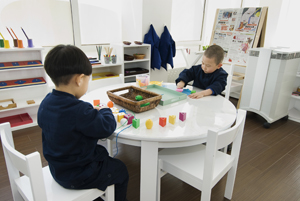 Pollution is a problem. We are regularly exposed to pollutants from vehicles and coal-burning plants, as well as toxins commonly found in our food and water. Exposure to these toxic compounds can lead to respiratory problems, cardiovascular disease and various forms of cancers. Unfortunately, children are most at risk as their small bodies concentrate toxins much more easily than adults. Compounding the problem, a child’s detoxification organs, such as their liver and lungs, are not yet fully developed. However, there are some practical steps you can take to protect you and your family, and many of them start at home.
Pollution is a problem. We are regularly exposed to pollutants from vehicles and coal-burning plants, as well as toxins commonly found in our food and water. Exposure to these toxic compounds can lead to respiratory problems, cardiovascular disease and various forms of cancers. Unfortunately, children are most at risk as their small bodies concentrate toxins much more easily than adults. Compounding the problem, a child’s detoxification organs, such as their liver and lungs, are not yet fully developed. However, there are some practical steps you can take to protect you and your family, and many of them start at home.
Check the Air Quality Index
The Air Quality Index (AQI) is used by many government agencies to determine the severity of pollution. In simple terms, the higher the AQI value, the higher the pollution level. The US embassy in Beijing posts the AQI values from their particle reader online multiple times a day (see p48 for details). Thevalues can change dramatically depending on environmental conditions, so visit the website multiple times a day and plan your activities accordingly. If the AQI is between 200-300, children and people with respiratory or heart conditions should avoid outdoor activities. When the AQI reaches over 300, it’s best for everyone to stay indoors and if you must venture out, it’s recommended to wear some protective gear.
 Wear a Facemask
Wear a Facemask
If you must go outside on a heavily polluted day, wear a facemask. The adverse effects of air pollution on the heart have been shown to be a result of fine particles in the air, which come from vehicle exhaust and industrial sources. Wearing a facemask with a high quality filter prevents people from inhaling these potentially harmful particles. Dr. Xi, a Beijing-based medical doctor and research fellow at the China Oxford Centre for International Health Research, together with Dr. Jeremy Langrish from the University of Edinburgh, recently completed a study that assessed the effectiveness of facemasks in protecting against pollution. Xi and Langrish found that a simple cloth facemask removed approximately 25 percent of the particles produced by a diesel engine, while a 3M brand 8812 industrial facemask removed more than 95 percent of the particles. "In our study, we have shown that reducing exposure to air pollution by wearing a facemask – even for a short time – reduces blood pressure and improves heart-rate variability (the ability of the heart to change its rate in response to demand), both of which are markers of heart health," says Langrish.
Invest in an Air Purifier
Ensure that the air in your home is as pollutant-free as possible by only smoking outdoors and by using a high quality air purifier like the IQ Air Health Pro 250 available from IQ Air stores across Beijing. Contact IQ Air for a free home air quality assessment. No matter which air purifier you choose, it should have a HEPA filtration system and use activated carbon. It’s also important to note that the air purifier must be appropriate for the size of the room. Dr. Richard Saint Cyr, a family physician at the International Medical Center and a regular blogger is somewhat of an expert in the area of pollution. "Don’t forget, we spend more than 80 percent of our lives indoors, so it’s important to take proactive steps to make your indoor air clean," advises Cyr. "Well-sealed doors and windows and proper air purifiers are important. And don’t forget the value of indoor plants."
Get Indoor Plants
There are three common household plants that have been shown to purify air indoors. They are easy to find in Beijing and won’t break the bank (RMB 120-200). The Areca Palm (风尾竹) is very good at converting carbon dioxide into oxygen. The Money Plant (绿萝) cleans the air of volatile chemicals and airborne toxins like formaldehyde, a known carcinogen that can be found in a variety of products including wood furniture, carpets and adhesives. Lastly, Mother-in-Law Tongue (虎皮兰) helps with oxygenation because, unlike most plants, it releases oxygen at night. This plant is best placed in the bedroom.
Eat Your Fruits and Veggies
Fresh produce is packed with antioxidants, enzymes and other compounds that counteract the negative effects of pollution on our bodies. Avoid harmful pesticides and buy organic fruits and vegetables wherever possible. Regardless of whether you eat organic or not, our bodies require good nutrition in order to stay healthy. As the saying goes, we are what we eat.
Drink Clean Water
Boiling Beijing tap water will kill certain organisms, but it will not remove the heavy metals and other chemicals it contains. When choosing a company for bottled water, opt for a large reputable supplier, as it is commonly believed that smaller resellers often refill containers with water from questionable sources. Another option is to use a high quality filtering system such as reverse osmosis. This filtration method is highly effective in removing all sorts of impurities, including viruses and bacteria.
Detox
Our body naturally clears our system of toxins and carcinogens but over time these harmful substances begin to build up. This can cause anything from headaches to digestive issues and more serious health problems. There are different degrees of detoxification. A light detox can be done by avoiding processed foods and consuming a diet high in organic fruits and vegetables, while saunas can be included as part of a more comprehensive detox. There are also various types of fasts that provide intense detox results. However, these treatments should only be followed under the supervision of a licensed naturopathic doctor.
 Take Action Outside the Home
Take Action Outside the Home
The good news is that people are concerned about the effects of pollution and are making changes. The Family Learning House, a Montessori kindergarten recently implemented a pollution monitoring and reporting system. Fanfan, an administrative assistant at the Learning House, checks pollution levels three times a day using the US embassy’s website. If pollution levels are too high, the children exercise indoors. The school is currently in the process of adding IQ Air purifiers in every classroom, as well as indoor plants. "The children’s intellectual, spiritual and physical needs are our primary concern, so of course anything we can do to protect and strengthen them physically, we will do," says Karyn Robarts, founder and principal of the Family Learning House. Parents can contact their child’s school and ask if a similar pollution warning system is in place. At work, suggest the addition of plants or air purifiers to the office.
It’s easy to ignore the issue of pollution. Its negative effects do not always surface right away and tend to develop over a long period of time. It’s also easy to feel overwhelmed because so much of what surrounds us is out of our hands. Thankfully, there is still a lot we can do to minimize our exposure and help our bodies handle the toxic load. By following some or all of these steps, you are taking an active role in ensuring that your health and that of your family is protected.
Dr. Melissa Rodriguez is a naturopathic doctor who lives with her family in Beijing, www.drmelissarodriguez.com
RESOURCES
IQ Air: Sells high quality air purifiers.
See Directory for locations.
www.iqair-china.com
MyHealth Beijing: Dr. Richard Saint Cyr’s regularly updated Beijing health blog.
www.myhealthbeijing.com
Air Quality Index: Beijing’s pollution levels are recorded multiple times a day on the US embassy’s particle reader.
http://iphone.bjair.info/
Liangma Flower Market: Indoor plants and green things. Delivery available.
Daily 8.30am-6.30pm. South bank of Liangma River, 758 Dongsanhuan Beilu, Chaoyang District
Laitai Flower Market: More green things. Delivery available.
Mon-Thu 9am-6pm, Fri 9am-6.30 pm, Sat-Sun 9am-7pm. 9 Maizidian Xilu, Chaoyang District
Green Cow Organic Farm: Organic produce.
Donggezhuan (10 min north of the International Exhibition Center), Houshayu Zhen, Shunyi District (8046 4301, 135 0113 6920)
Therese’s Farm: Organic produce. Free delivery every Friday inside the Fifth Ring Road.
Details at 1370 1277 398 or will2bdone@yahoo.com
www.youjinongzhuang.com



